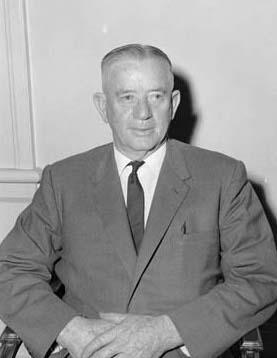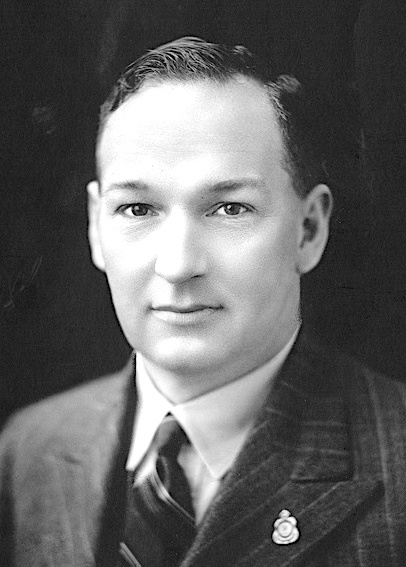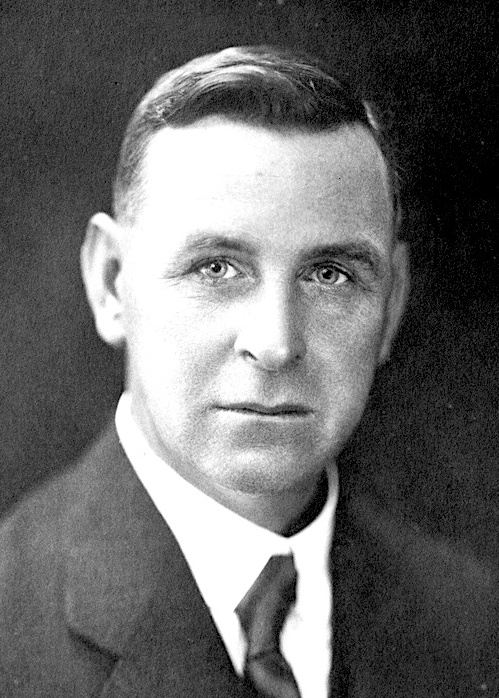|
Emergency Committee Of South Australia
The Emergency Committee of South Australia was the major anti-Labor grouping in South Australia at the 1931 federal election. History The Emergency Committee arose as a consequence of the financial turmoil brought about by the Great Depression in Australia, and was opposed to what it saw as the "financial extremists" in James Scullin's federal Labor government. The Emergency Committee ran in place of the United Australia Party and the Country Party at the national level, with the assistance of the Liberal Federation and the SA Country Party at the state level, and the additional assistance of the Citizens' League, the Political Reform League, and the Producers and Business Men's Political Committee. 1931 federal election In the House of Representatives, the Emergency Committee took an additional two seats, Adelaide and Grey, to win six of the state's seven seats. Hindmarsh was the only seat in the state retained by Labor. Originally holding just the two seats of Barker and W ... [...More Info...] [...Related Items...] OR: [Wikipedia] [Google] [Baidu] |
Australian Labor Party
The Australian Labor Party (ALP), also simply known as Labor, is the major centre-left political party in Australia, one of two major parties in Australian politics, along with the centre-right Liberal Party of Australia. The party forms the federal government since being elected in the 2022 election. The ALP is a federal party, with political branches in each state and territory. They are currently in government in Victoria, Queensland, Western Australia, South Australia, the Australian Capital Territory, and the Northern Territory. They are currently in opposition in New South Wales and Tasmania. It is the oldest political party in Australia, being established on 8 May 1901 at Parliament House, Melbourne, the meeting place of the first federal Parliament. The ALP was not founded as a federal party until after the first sitting of the Australian parliament in 1901. It is regarded as descended from labour parties founded in the various Australian colonies by the emerging la ... [...More Info...] [...Related Items...] OR: [Wikipedia] [Google] [Baidu] |
Moses Gabb
Joel Moses Gabb (21 November 1882 – 6 March 1951) was an Australian politician. He was a member of the Australian House of Representatives from 1919 to 1934, representing the electorate of Division of Angas (1903–34), Angas. He represented the Australian Labor Party until resigning during the Australian Labor Party split of 1931, 1931 Labor split; however, he did not join the United Australia Party along with the other dissident MPs, and instead remained in parliament as an independent. Early life, missionary and business work Gabb was born in Glenelg, South Australia, Glenelg, and was educated at St Peter's College, Adelaide, St Peter's College. He worked for printers A. & E. Lewis and then for grocers Barns, Stobie, & Co. after leaving school. He had studied at night to become a Methodist missionary while working at the grocers, and after qualifying for home mission work, worked from 1905 reopening a mission on Kangaroo Island, then at churches in Cockburn, South Austr ... [...More Info...] [...Related Items...] OR: [Wikipedia] [Google] [Baidu] |
Political Parties With Year Of Disestablishment Missing
Politics (from , ) is the set of activities that are associated with making decisions in groups, or other forms of power relations among individuals, such as the distribution of resources or status. The branch of social science that studies politics and government is referred to as political science. It may be used positively in the context of a "political solution" which is compromising and nonviolent, or descriptively as "the art or science of government", but also often carries a negative connotation.. The concept has been defined in various ways, and different approaches have fundamentally differing views on whether it should be used extensively or limitedly, empirically or normatively, and on whether conflict or co-operation is more essential to it. A variety of methods are deployed in politics, which include promoting one's own political views among people, negotiation with other political subjects, making laws, and exercising internal and external force, including ... [...More Info...] [...Related Items...] OR: [Wikipedia] [Google] [Baidu] |
Political Parties With Year Of Establishment Missing
Politics (from , ) is the set of activities that are associated with making decisions in groups, or other forms of power relations among individuals, such as the distribution of resources or status. The branch of social science that studies politics and government is referred to as political science. It may be used positively in the context of a "political solution" which is compromising and nonviolent, or descriptively as "the art or science of government", but also often carries a negative connotation.. The concept has been defined in various ways, and different approaches have fundamentally differing views on whether it should be used extensively or limitedly, empirically or normatively, and on whether conflict or co-operation is more essential to it. A variety of methods are deployed in politics, which include promoting one's own political views among people, negotiation with other political subjects, making laws, and exercising internal and external force, including wa ... [...More Info...] [...Related Items...] OR: [Wikipedia] [Google] [Baidu] |
Defunct Political Parties In South Australia
{{Disambiguation ...
Defunct (no longer in use or active) may refer to: * ''Defunct'' (video game), 2014 * Zombie process or defunct process, in Unix-like operating systems See also * * :Former entities * End-of-life product * Obsolescence Obsolescence is the state of being which occurs when an object, service, or practice is no longer maintained or required even though it may still be in good working order. It usually happens when something that is more efficient or less risky r ... [...More Info...] [...Related Items...] OR: [Wikipedia] [Google] [Baidu] |
Playmander
The Playmander was a gerrymandering system, a pro-rural electoral malapportionment in the Australian state of South Australia, which was introduced by the incumbent Liberal and Country League (LCL) government in 1936, and remained in place for 32 years until 1968. This consisted of 26 low-population rural seats holding as much as a 10-to-1 advantage over the 13 high-population metropolitan seats in the state parliament, even though rural seats contained only a third of South Australia's population during this period. At the peak of the malapportionment in 1968, the rural seat of Frome had 4,500 formal votes, while the metropolitan seat of Enfield had 42,000 formal votes. Additionally, there was also a change from multi-member seats to single-member seats for the first time in South Australia's history, while the number of MPs in the lower house was reduced from 46 to 39. During the Playmander's existence, Labor managed to win enough parliamentary seats to form government onl ... [...More Info...] [...Related Items...] OR: [Wikipedia] [Google] [Baidu] |
Malapportionment
Apportionment is the process by which seats in a legislative body are distributed among administrative divisions, such as states or parties, entitled to representation. This page presents the general principles and issues related to apportionment. The page Apportionment by country describes specific practices used around the world. The page Mathematics of apportionment describes mathematical formulations and properties of apportionment rules. The simplest and most universal principle is that elections should give each voter's intentions equal weight. This is both intuitive and stated in laws such as the Fourteenth Amendment to the United States Constitution (the Equal Protection Clause). However, there are a variety of historical and technical reasons why this principle is not followed absolutely or, in some cases, as a first priority. Common problems Fundamentally, the representation of a population in the thousands or millions by a reasonable size, thus accountable governing ... [...More Info...] [...Related Items...] OR: [Wikipedia] [Google] [Baidu] |
1965 South Australian State Election
State elections were held in South Australia on 6 March 1965. All 39 seats in the South Australian House of Assembly were up for election. The incumbent Liberal and Country League led by Premiers of South Australia, Premier of South Australia Thomas Playford IV, in power since 1938, was defeated by the Australian Labor Party (South Australian Branch), Australian Labor Party led by Leader of the Opposition (South Australia), Leader of the Opposition Frank Walsh. Background Even though Australian Labor Party (South Australian Branch), Labor won the 1944 South Australian state election, 1944, 1953 South Australian state election, 1953 and 1962 South Australian state election, 1962 elections on the Two-party-preferred vote, two-party vote against Thomas Playford IV and the Liberal and Country League (LCL), the electoral rural overweighting known as the Playmander since 1936 consisted of rural districts enjoying a 2-to-1 advantage in the Parliament of South Australia, state parliament. ... [...More Info...] [...Related Items...] OR: [Wikipedia] [Google] [Baidu] |
Liberal Party Of Australia (South Australian Division)
The Liberal Party of Australia (South Australian Division), commonly known as the South Australian Liberals, is the South Australian Division of the Liberal Party of Australia. It was formed as the Liberal and Country League (LCL) in 1932 and became the South Australian Division of the Liberal Party when the Liberal Party was formed in 1945. It retained its Liberal and Country League name before changing to its current name in 1974. It is one of two major parties in the bicameral Parliament of South Australia, the other being the Australian Labor Party (SA Branch). The party has been led by Leader of the Opposition David Speirs since the 2022 state election after a one-term government. During its 42-year existence as the Liberal and Country League, it spent 34 years in government, mainly due to an electoral malapportionment scheme known as the Playmander. The Playmander was named after LCL leader Sir Tom Playford, who was the Premier of South Australia for 27 years from 1938 ... [...More Info...] [...Related Items...] OR: [Wikipedia] [Google] [Baidu] |
1933 South Australian State Election
State elections were held in South Australia on 8 April 1933. All 46 seats in the South Australian House of Assembly were up for election. The incumbent Parliamentary Labor Party government led by Premier Robert Richards was defeated by the opposition Liberal and Country League led by Leader of the Opposition Richard L. Butler. Each district elected multiple members. Background After the ALP government of Premier Lionel Hill endorsed the controversial Premiers' Plan following the start of the Great Depression in Australia and the subsequent Australian Labor Party split of 1931, the ALP state executive expelled 23 of the 30 members of the ALP caucus, including the entire cabinet. The expelled MPs formed the Parliamentary Labor Party (also known as Premiers Plan Labor), with Hill as leader and Premier, and continued in office with the support of the Butler-led Liberal Federation. Amid increasing riots and protests, as well as skyrocketing unemployment, Hill left politics to bec ... [...More Info...] [...Related Items...] OR: [Wikipedia] [Google] [Baidu] |
Liberal And Country League
Liberal or liberalism may refer to: Politics * a supporter of liberalism ** Liberalism by country * an adherent of a Liberal Party * Liberalism (international relations) * Sexually liberal feminism * Social liberalism Arts, entertainment and media * ''El Liberal'', a Spanish newspaper published 1879–1936 * ''The Liberal'', a British political magazine published 2004–2012 * ''Liberalism'' (book), a 1927 book by Ludwig von Mises * "Liberal", a song by Band-Maid from the 2019 album '' Conqueror'' Places in the United States * Liberal, Indiana * Liberal, Kansas * Liberal, Missouri * Liberal, Oregon Religion * Religious liberalism * Liberal Christianity * Liberalism and progressivism within Islam * Liberal Judaism (other) See also * * * Liberal arts (other) * Neoliberalism, a political-economic philosophy * The Liberal Wars The Liberal Wars (), also known as the Portuguese Civil War (), the War of the Two Brothers () or Miguelite War (), was ... [...More Info...] [...Related Items...] OR: [Wikipedia] [Google] [Baidu] |
Australian Senate
The Senate is the upper house of the Bicameralism, bicameral Parliament of Australia, the lower house being the House of Representatives (Australia), House of Representatives. The composition and powers of the Senate are established in Chapter I of the Constitution of Australia. There are a total of 76 senators: 12 are elected from each of the six states and territories of Australia, Australian states regardless of population and 2 from each of the two autonomous internal states and territories of Australia, Australian territories (the Australian Capital Territory and the Northern Territory). Senators are popularly elected under the single transferable vote system of proportional representation. Unlike upper houses in other Westminster system, Westminster-style parliamentary systems, the Senate is vested with significant powers, including the capacity to reject all bills, including budget and appropriation bills, initiated by the government in the House of Representatives, maki ... [...More Info...] [...Related Items...] OR: [Wikipedia] [Google] [Baidu] |







